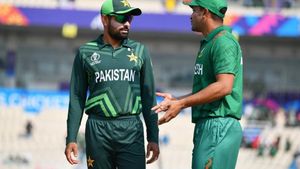The ICC Champions Trophy 2025 has showcased the fierce rivalry between India and Pakistan, particularly highlighted by Pakistan's struggles after their latest match. On February 24, 2025, India triumphed over Pakistan by four wickets at the Dubai International Stadium, dealing Pakistan's hopes of making it to the semi-finals another severe blow. With star player Virat Kohli scoring a magnificent century, India has firmly established itself as the team to beat, leaving Pakistan at the risk of early elimination.
During the match, Pakistan’s captain Mohammad Rizwan chose to bat first after winning the toss, but the team faltered. Despite Babar Azam and Saud Shakeel making modest contributions, their efforts weren’t enough as Pakistan was bowled out for just 242 runs. Shakeel scored 62 runs before being dismissed, but the lack of significant partnerships marred the innings and allowed India to chase down the target with ease.
Fans of the Pakistan cricket team expressed their frustration following the loss. One fan lamented, “We had high hopes for our team to score at least 315. Even if we lost, they should have at least stopped Kohli’s century.” The general sentiment was filled with disappointment, and calls for the Pakistan Cricket Board (PCB) to introduce new talent surfaced as supporters demanded accountability for the team's poor performance.
This defeat marked Pakistan's second consecutive loss, following their previous defeat to New Zealand. Their current standing leaves them at the bottom of Group A, needing favorable outcomes from other matches to keep their qualification chances alive. For Pakistan to advance, they need to win their upcoming match against Bangladesh and rely on New Zealand losing their remaining games against both Bangladesh and India.
Shakeel addressed the need for improvement, stating, “We cannot afford to lose wickets quickly. We need to build partnerships; otherwise, we cannot win matches.” Captain Rizwan echoed this sentiment, admitting, “For now, we can say it’s over. This is the truth.” The path to the knockout stage is extremely challenging: if they win their final match and other results go their way, they could tie with New Zealand and Bangladesh, potentially advancing based on net run rate.
Pakistan’s performance, particularly against India, has reignited discussions about the wider issues affecting the team's capabilities. The fiery Javed Miandad, a cricketing icon for Pakistan, indicated the cultural underpinnings of their cricket ethos. Speaking of the concept known as izzat - emphasizing honor and respect - Miandad believes such ideals are significant for Pakistan's cricketing future. Yet the repeated losses to India have, he says, created challenges to this mindset.
Analysts have suggested there is growing concern over Pakistan’s cricketing system, what they see as insecurity among players, and hints of psychological barriers when facing India. Madan Lal, part of India’s 1983 World Cup winning squad, remarked, “Pakistan has no system in place, no streamlining of talent. It is total mess.” This lack of structure has been underscored by numerous failures — not just against India but across several tournament formats.
The current structure of the tournament sees teams struggling to adapt under pressure, with India's recent performances showing composure and strength, particularly evident during the crunch match against Pakistan. Kohli's performance, marked by his century, stood out as he capitalized on opportunities, not only securing the win but establishing India’s dominance over their rivals.
Pakistan has faced India just twice successfully across ICC tournaments — the 2017 Champions Trophy final and the 2021 T20 World Cup. This lack of recent successes, coupled with the current competitive atmosphere, raises the question of whether the hype surrounding these matchups will continue if the results remain lopsided.
Looking forward, the upcoming clash with Bangladesh presents Pakistan with their last chance to keep hopes of semifinals alive. Fans and analysts alike are noting the importance of building confidence within the team; yet, this confidence must come with tangible results. The pressure on the players is immense, and with their future resting on subsequent match results, the call for rethinking strategies cannot be overstated.
The combined weight of history, cultural expectations, and continuous struggles only adds to the emphasis placed on upcoming performances. Meanwhile, India continues to carve out success, showing not only superior performance but also commanding more recognition and respect within the cricketing arena. This Champions Trophy could very well delineate the paths both teams will take moving forward.
With Pakistan needing to overcome their recent setbacks, they face both internal challenges and reactions from devoted fans disappointed by another underwhelming performance. Supporters hope for positive change, new talent, and, most critically, results as they approach the pivotal final matches of the tournament.



